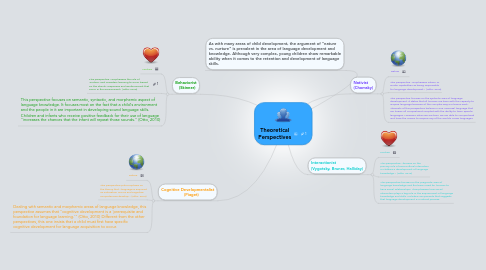Theoretical Perspectives
作者:Kristina Varner

1. Behaviorist (Skinner)
1.1. Nurture
1.2. This perspective "emphasizes the role of 'nurture' and considers learning to occur based on the stimuli, responses and reinforcement that occur in the environment" (Otto, 2010)
1.3. This perspective focuses on semantic, syntactic, and morphemic aspect of language knowledge. It focuses most on the fact that a child's environment and the people in it are important in developing sound language skills. Children and infants who receive positive feedback for their use of language "increases the chances that the infant will repeat those sounds." (Otto, 2010)
2. Cognitive Developmentalist (Piaget)
2.1. Nature
2.2. This perspective puts emphasis on the theory that "language is acquired as maturation occurs and cognitive competencies develop." (Otto, 2010)
2.3. Dealing with semantic and morphemic areas of language knowledge, this perspective assumes that "cognitive development is a 'prerequisite and foundation for language learning.'" (Otto, 2010) Different from the other perspectives, this one insists that a child must first have specific cognitive development for language acquisition to occur.
3. As with many areas of child development, the argument of "nature vs. nurture" is prevalent in the area of language development and knowledge. Although very complex, young children show remarkable ability when it comes to the retention and development of language skills.
4. Nativist (Chomsky)
4.1. Nature
4.2. This perspective "emphasizes inborn or innate capabilities as being responsible for language development." (Otto, 2010)
4.3. This perspective focuses on the syntactic area of language development. It states that all humans are born with the capacity to acquire language because of the complex way our brains work. Theorists of this perspective believe in one universal language that our brains all comprehend coupled with the ability to learn specific languages. However, when we are born we are able to comprehend and have the means to acquire any of the world's 3,000 languages.
5. Interactionist (Vygotsky, Bruner, Halliday)
5.1. Nurture
5.2. This perspective "focuses on the primary role of sociocultural interaction in children's development of language knowledge." (Otto, 2010)
5.3. This perspective focuses on the pragmatic area of language knowledge and the basic need for humans to have social relationships. It emphasizes how social interaction plays a big role in the acquirement of language knowledge and skills. Includes components that suggests that language development is a natural process.


